University Case Study: Google's Cross-Cultural Negotiation in China
VerifiedAdded on 2020/04/21
|5
|1305
|104
Case Study
AI Summary
This case study analyzes Google's cross-cultural negotiation with the Chinese government, focusing on the challenges faced when entering the Chinese market. The analysis delves into individual, group, and organizational level issues, including leadership styles, cultural differences, and the need to comply with government regulations. The study identifies key problems such as conflicting leadership styles, the contradiction between Google's values and Chinese culture, and customer dissatisfaction due to content restrictions. Recommendations are provided to address these issues, including adapting leadership styles, modifying company policies, forming strategic partnerships, and aligning goals with the country's interests. The case emphasizes the importance of understanding the external business environment and adapting strategies to achieve success in international markets, particularly in a culturally sensitive environment like China.
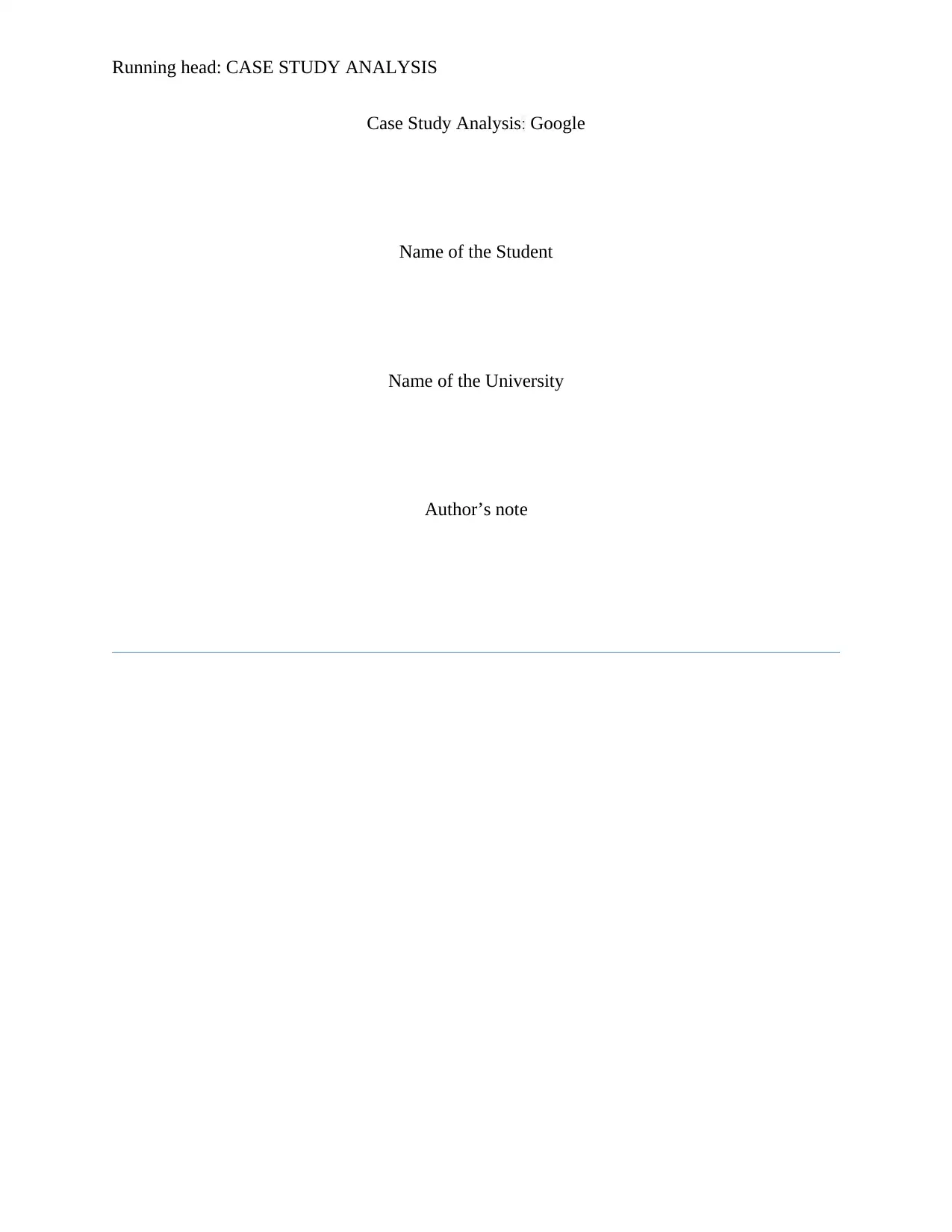
Running head: CASE STUDY ANALYSIS
Case Study Analysis: Google
Name of the Student
Name of the University
Author’s note
Case Study Analysis: Google
Name of the Student
Name of the University
Author’s note
Paraphrase This Document
Need a fresh take? Get an instant paraphrase of this document with our AI Paraphraser
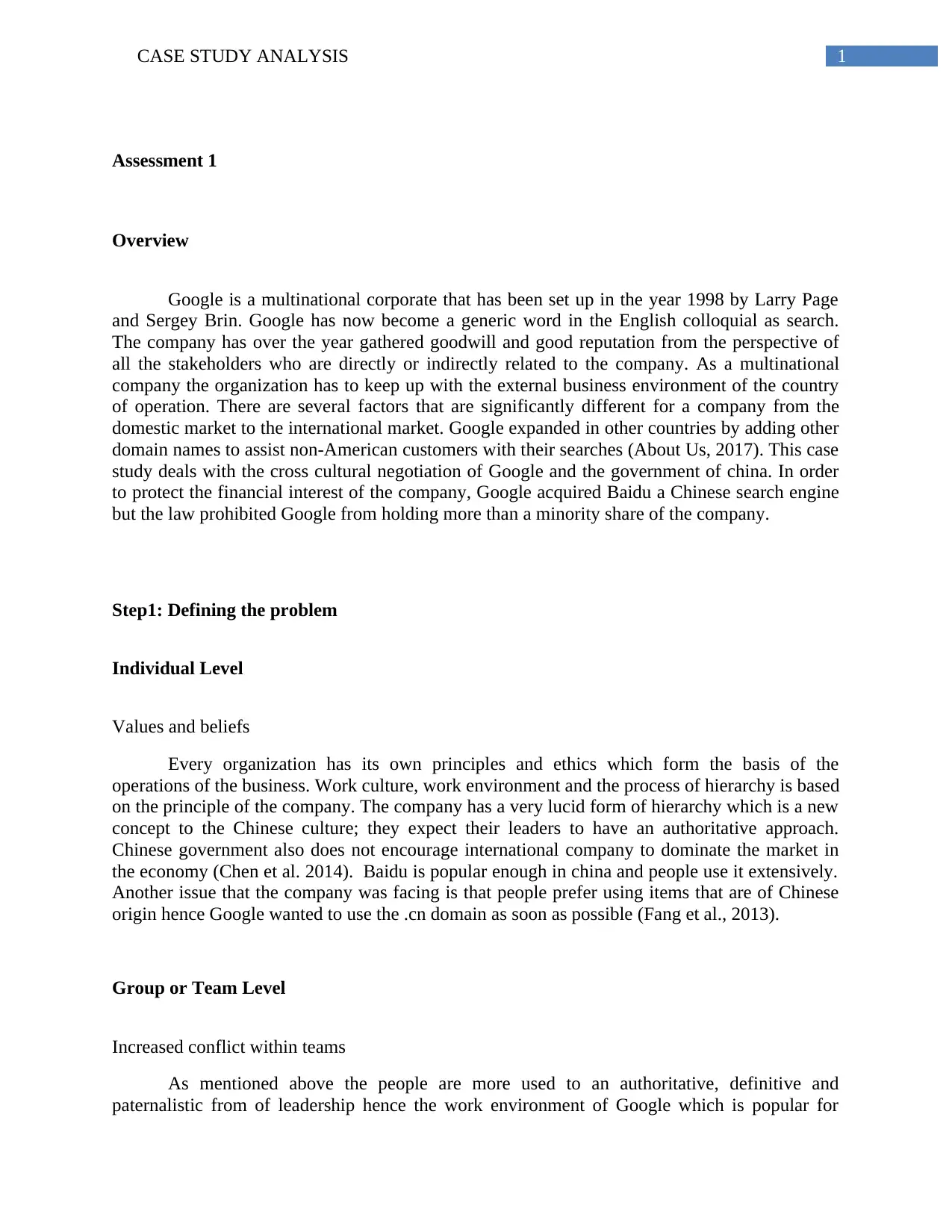
1CASE STUDY ANALYSIS
Assessment 1
Overview
Google is a multinational corporate that has been set up in the year 1998 by Larry Page
and Sergey Brin. Google has now become a generic word in the English colloquial as search.
The company has over the year gathered goodwill and good reputation from the perspective of
all the stakeholders who are directly or indirectly related to the company. As a multinational
company the organization has to keep up with the external business environment of the country
of operation. There are several factors that are significantly different for a company from the
domestic market to the international market. Google expanded in other countries by adding other
domain names to assist non-American customers with their searches (About Us, 2017). This case
study deals with the cross cultural negotiation of Google and the government of china. In order
to protect the financial interest of the company, Google acquired Baidu a Chinese search engine
but the law prohibited Google from holding more than a minority share of the company.
Step1: Defining the problem
Individual Level
Values and beliefs
Every organization has its own principles and ethics which form the basis of the
operations of the business. Work culture, work environment and the process of hierarchy is based
on the principle of the company. The company has a very lucid form of hierarchy which is a new
concept to the Chinese culture; they expect their leaders to have an authoritative approach.
Chinese government also does not encourage international company to dominate the market in
the economy (Chen et al. 2014). Baidu is popular enough in china and people use it extensively.
Another issue that the company was facing is that people prefer using items that are of Chinese
origin hence Google wanted to use the .cn domain as soon as possible (Fang et al., 2013).
Group or Team Level
Increased conflict within teams
As mentioned above the people are more used to an authoritative, definitive and
paternalistic from of leadership hence the work environment of Google which is popular for
Assessment 1
Overview
Google is a multinational corporate that has been set up in the year 1998 by Larry Page
and Sergey Brin. Google has now become a generic word in the English colloquial as search.
The company has over the year gathered goodwill and good reputation from the perspective of
all the stakeholders who are directly or indirectly related to the company. As a multinational
company the organization has to keep up with the external business environment of the country
of operation. There are several factors that are significantly different for a company from the
domestic market to the international market. Google expanded in other countries by adding other
domain names to assist non-American customers with their searches (About Us, 2017). This case
study deals with the cross cultural negotiation of Google and the government of china. In order
to protect the financial interest of the company, Google acquired Baidu a Chinese search engine
but the law prohibited Google from holding more than a minority share of the company.
Step1: Defining the problem
Individual Level
Values and beliefs
Every organization has its own principles and ethics which form the basis of the
operations of the business. Work culture, work environment and the process of hierarchy is based
on the principle of the company. The company has a very lucid form of hierarchy which is a new
concept to the Chinese culture; they expect their leaders to have an authoritative approach.
Chinese government also does not encourage international company to dominate the market in
the economy (Chen et al. 2014). Baidu is popular enough in china and people use it extensively.
Another issue that the company was facing is that people prefer using items that are of Chinese
origin hence Google wanted to use the .cn domain as soon as possible (Fang et al., 2013).
Group or Team Level
Increased conflict within teams
As mentioned above the people are more used to an authoritative, definitive and
paternalistic from of leadership hence the work environment of Google which is popular for
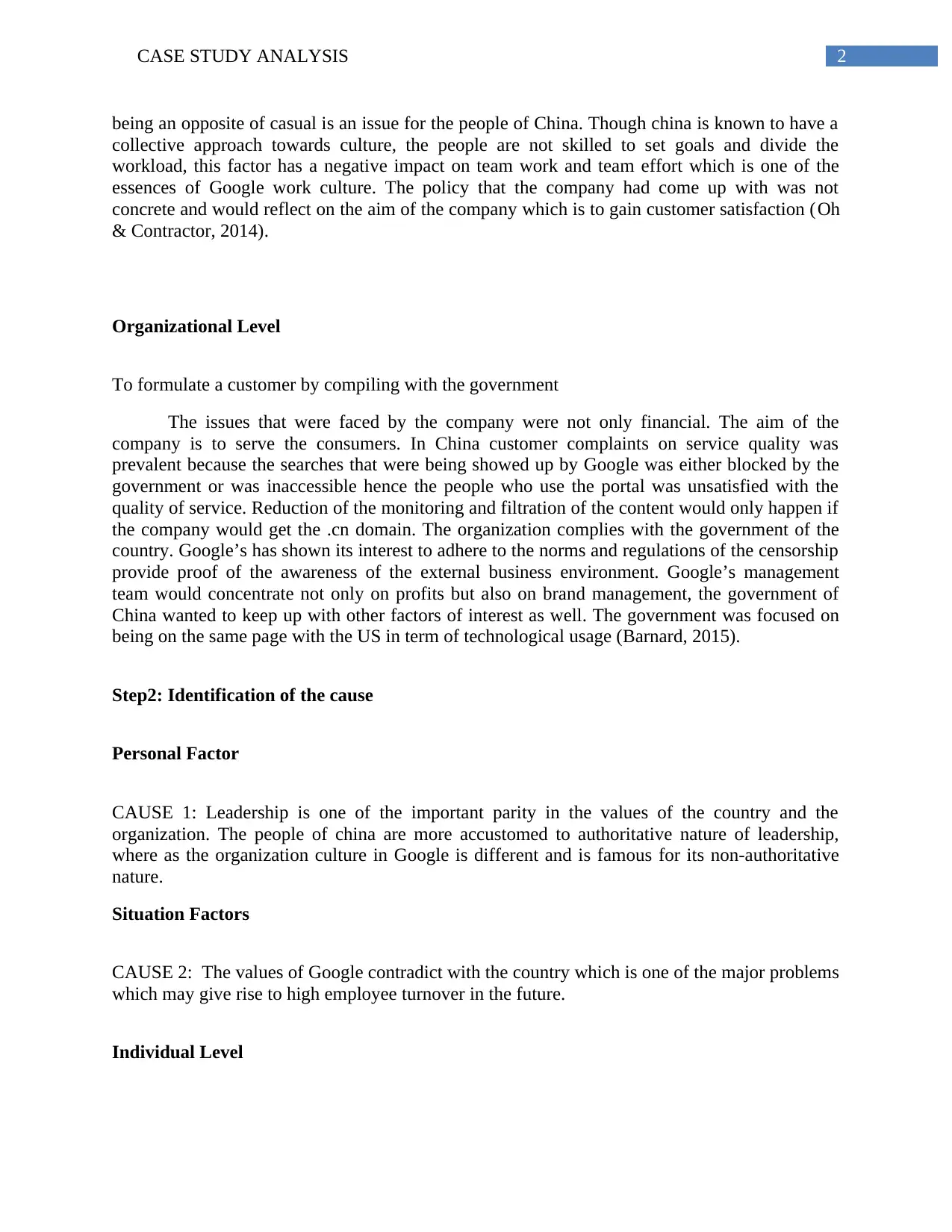
2CASE STUDY ANALYSIS
being an opposite of casual is an issue for the people of China. Though china is known to have a
collective approach towards culture, the people are not skilled to set goals and divide the
workload, this factor has a negative impact on team work and team effort which is one of the
essences of Google work culture. The policy that the company had come up with was not
concrete and would reflect on the aim of the company which is to gain customer satisfaction (Oh
& Contractor, 2014).
Organizational Level
To formulate a customer by compiling with the government
The issues that were faced by the company were not only financial. The aim of the
company is to serve the consumers. In China customer complaints on service quality was
prevalent because the searches that were being showed up by Google was either blocked by the
government or was inaccessible hence the people who use the portal was unsatisfied with the
quality of service. Reduction of the monitoring and filtration of the content would only happen if
the company would get the .cn domain. The organization complies with the government of the
country. Google’s has shown its interest to adhere to the norms and regulations of the censorship
provide proof of the awareness of the external business environment. Google’s management
team would concentrate not only on profits but also on brand management, the government of
China wanted to keep up with other factors of interest as well. The government was focused on
being on the same page with the US in term of technological usage (Barnard, 2015).
Step2: Identification of the cause
Personal Factor
CAUSE 1: Leadership is one of the important parity in the values of the country and the
organization. The people of china are more accustomed to authoritative nature of leadership,
where as the organization culture in Google is different and is famous for its non-authoritative
nature.
Situation Factors
CAUSE 2: The values of Google contradict with the country which is one of the major problems
which may give rise to high employee turnover in the future.
Individual Level
being an opposite of casual is an issue for the people of China. Though china is known to have a
collective approach towards culture, the people are not skilled to set goals and divide the
workload, this factor has a negative impact on team work and team effort which is one of the
essences of Google work culture. The policy that the company had come up with was not
concrete and would reflect on the aim of the company which is to gain customer satisfaction (Oh
& Contractor, 2014).
Organizational Level
To formulate a customer by compiling with the government
The issues that were faced by the company were not only financial. The aim of the
company is to serve the consumers. In China customer complaints on service quality was
prevalent because the searches that were being showed up by Google was either blocked by the
government or was inaccessible hence the people who use the portal was unsatisfied with the
quality of service. Reduction of the monitoring and filtration of the content would only happen if
the company would get the .cn domain. The organization complies with the government of the
country. Google’s has shown its interest to adhere to the norms and regulations of the censorship
provide proof of the awareness of the external business environment. Google’s management
team would concentrate not only on profits but also on brand management, the government of
China wanted to keep up with other factors of interest as well. The government was focused on
being on the same page with the US in term of technological usage (Barnard, 2015).
Step2: Identification of the cause
Personal Factor
CAUSE 1: Leadership is one of the important parity in the values of the country and the
organization. The people of china are more accustomed to authoritative nature of leadership,
where as the organization culture in Google is different and is famous for its non-authoritative
nature.
Situation Factors
CAUSE 2: The values of Google contradict with the country which is one of the major problems
which may give rise to high employee turnover in the future.
Individual Level
⊘ This is a preview!⊘
Do you want full access?
Subscribe today to unlock all pages.

Trusted by 1+ million students worldwide
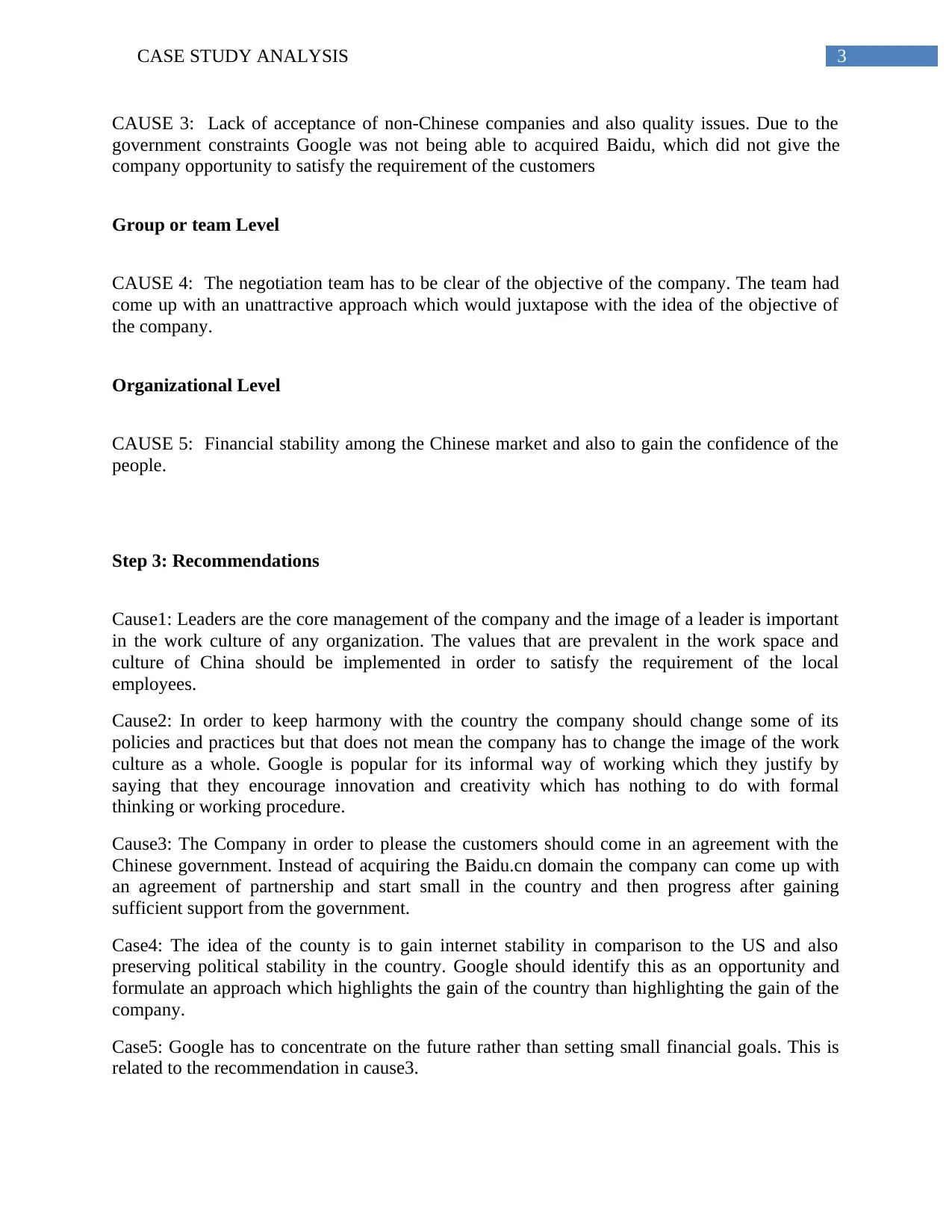
3CASE STUDY ANALYSIS
CAUSE 3: Lack of acceptance of non-Chinese companies and also quality issues. Due to the
government constraints Google was not being able to acquired Baidu, which did not give the
company opportunity to satisfy the requirement of the customers
Group or team Level
CAUSE 4: The negotiation team has to be clear of the objective of the company. The team had
come up with an unattractive approach which would juxtapose with the idea of the objective of
the company.
Organizational Level
CAUSE 5: Financial stability among the Chinese market and also to gain the confidence of the
people.
Step 3: Recommendations
Cause1: Leaders are the core management of the company and the image of a leader is important
in the work culture of any organization. The values that are prevalent in the work space and
culture of China should be implemented in order to satisfy the requirement of the local
employees.
Cause2: In order to keep harmony with the country the company should change some of its
policies and practices but that does not mean the company has to change the image of the work
culture as a whole. Google is popular for its informal way of working which they justify by
saying that they encourage innovation and creativity which has nothing to do with formal
thinking or working procedure.
Cause3: The Company in order to please the customers should come in an agreement with the
Chinese government. Instead of acquiring the Baidu.cn domain the company can come up with
an agreement of partnership and start small in the country and then progress after gaining
sufficient support from the government.
Case4: The idea of the county is to gain internet stability in comparison to the US and also
preserving political stability in the country. Google should identify this as an opportunity and
formulate an approach which highlights the gain of the country than highlighting the gain of the
company.
Case5: Google has to concentrate on the future rather than setting small financial goals. This is
related to the recommendation in cause3.
CAUSE 3: Lack of acceptance of non-Chinese companies and also quality issues. Due to the
government constraints Google was not being able to acquired Baidu, which did not give the
company opportunity to satisfy the requirement of the customers
Group or team Level
CAUSE 4: The negotiation team has to be clear of the objective of the company. The team had
come up with an unattractive approach which would juxtapose with the idea of the objective of
the company.
Organizational Level
CAUSE 5: Financial stability among the Chinese market and also to gain the confidence of the
people.
Step 3: Recommendations
Cause1: Leaders are the core management of the company and the image of a leader is important
in the work culture of any organization. The values that are prevalent in the work space and
culture of China should be implemented in order to satisfy the requirement of the local
employees.
Cause2: In order to keep harmony with the country the company should change some of its
policies and practices but that does not mean the company has to change the image of the work
culture as a whole. Google is popular for its informal way of working which they justify by
saying that they encourage innovation and creativity which has nothing to do with formal
thinking or working procedure.
Cause3: The Company in order to please the customers should come in an agreement with the
Chinese government. Instead of acquiring the Baidu.cn domain the company can come up with
an agreement of partnership and start small in the country and then progress after gaining
sufficient support from the government.
Case4: The idea of the county is to gain internet stability in comparison to the US and also
preserving political stability in the country. Google should identify this as an opportunity and
formulate an approach which highlights the gain of the country than highlighting the gain of the
company.
Case5: Google has to concentrate on the future rather than setting small financial goals. This is
related to the recommendation in cause3.
Paraphrase This Document
Need a fresh take? Get an instant paraphrase of this document with our AI Paraphraser
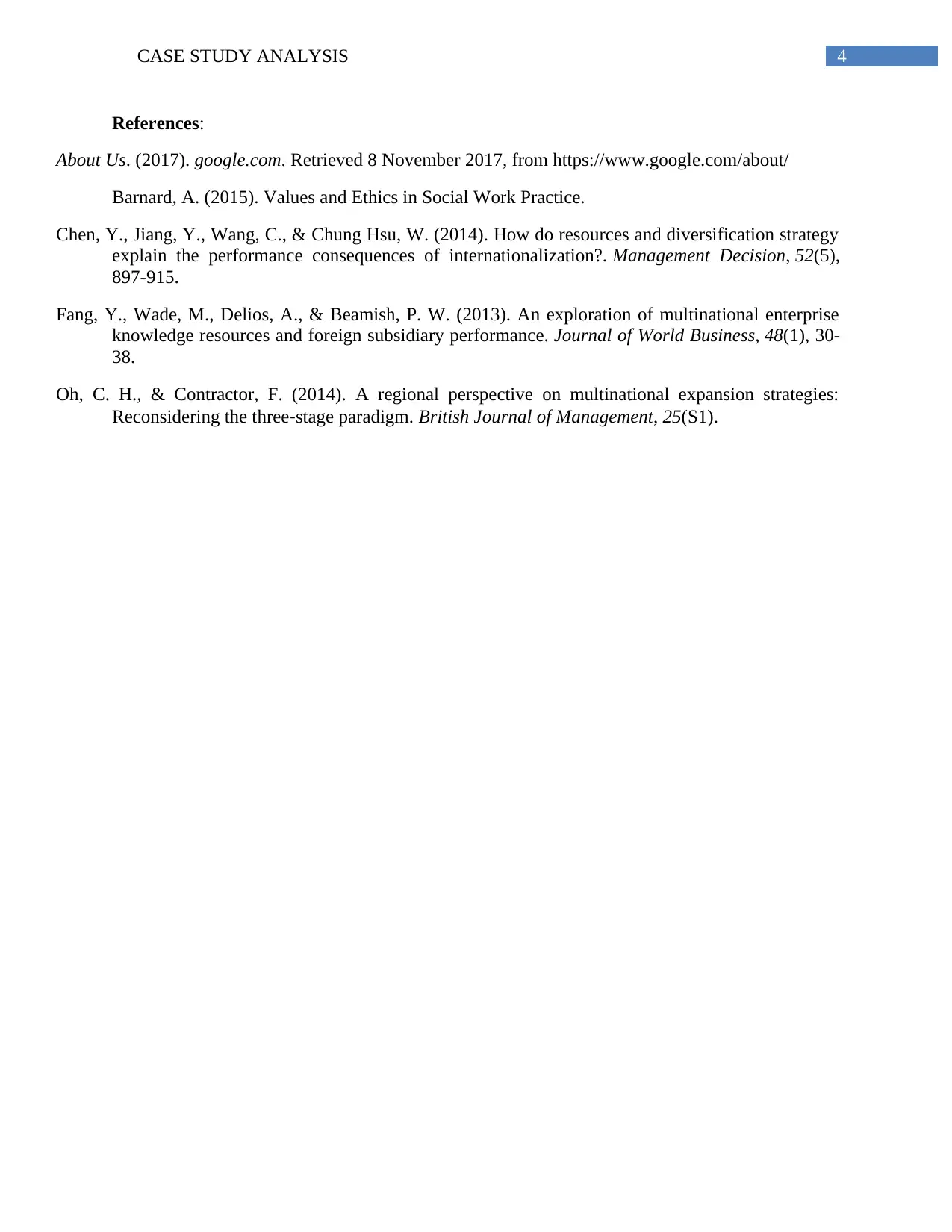
4CASE STUDY ANALYSIS
References:
About Us. (2017). google.com. Retrieved 8 November 2017, from https://www.google.com/about/
Barnard, A. (2015). Values and Ethics in Social Work Practice.
Chen, Y., Jiang, Y., Wang, C., & Chung Hsu, W. (2014). How do resources and diversification strategy
explain the performance consequences of internationalization?. Management Decision, 52(5),
897-915.
Fang, Y., Wade, M., Delios, A., & Beamish, P. W. (2013). An exploration of multinational enterprise
knowledge resources and foreign subsidiary performance. Journal of World Business, 48(1), 30-
38.
Oh, C. H., & Contractor, F. (2014). A regional perspective on multinational expansion strategies:
Reconsidering the three‐stage paradigm. British Journal of Management, 25(S1).
References:
About Us. (2017). google.com. Retrieved 8 November 2017, from https://www.google.com/about/
Barnard, A. (2015). Values and Ethics in Social Work Practice.
Chen, Y., Jiang, Y., Wang, C., & Chung Hsu, W. (2014). How do resources and diversification strategy
explain the performance consequences of internationalization?. Management Decision, 52(5),
897-915.
Fang, Y., Wade, M., Delios, A., & Beamish, P. W. (2013). An exploration of multinational enterprise
knowledge resources and foreign subsidiary performance. Journal of World Business, 48(1), 30-
38.
Oh, C. H., & Contractor, F. (2014). A regional perspective on multinational expansion strategies:
Reconsidering the three‐stage paradigm. British Journal of Management, 25(S1).
1 out of 5
Related Documents
Your All-in-One AI-Powered Toolkit for Academic Success.
+13062052269
info@desklib.com
Available 24*7 on WhatsApp / Email
![[object Object]](/_next/static/media/star-bottom.7253800d.svg)
Unlock your academic potential
Copyright © 2020–2026 A2Z Services. All Rights Reserved. Developed and managed by ZUCOL.





